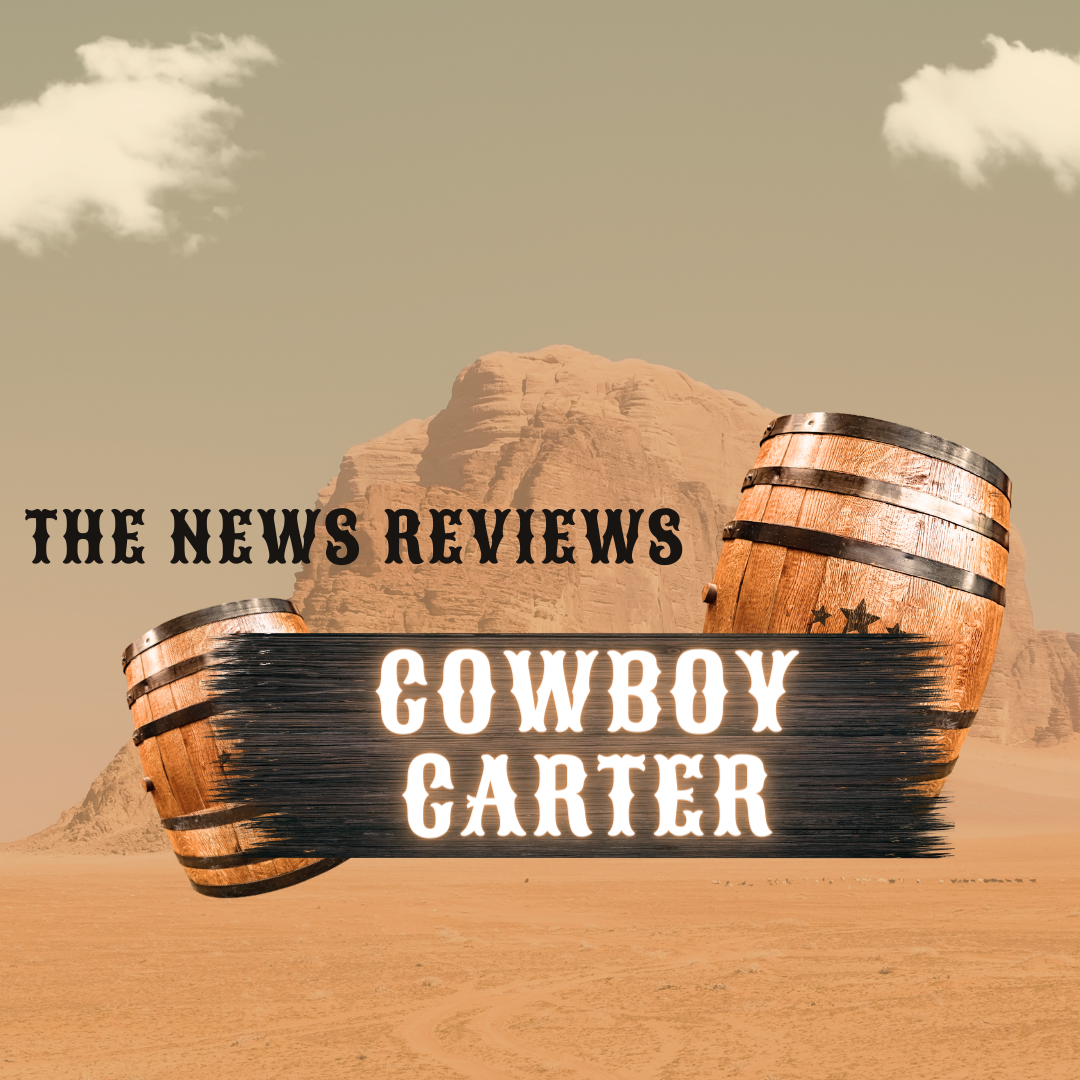Beyoncé’s divisive new album “Cowboy Carter” is an uneven yet satisfying odyssey through the scope of American music.
I wrote a previous column about the controversy surrounding the premise of a Beyoncé country album. My views on the subject are more or less unchanged. It’s ridiculous to act like Beyoncé can’t or shouldn’t make country music, and even more bizarre to be genuinely furious about it given the state of modern pop country. At the same time, the first two singles were clearly not country with a capital C, and there were elements of other genres at play in both.
The release of “Cowboy Carter” has only strengthened both of those points. Regarding the latter, this album feels like an assault on the very idea of genre limitations. Beyoncé makes drastic genre shifts throughout this album, not only between songs but within them. At the very least, elements of country, hip-hop, gospel, pop and R&B are present throughout. The album seems tailor-made for the umbrella genre of Americana, yet much of the press for it is insistent on calling it a ‘country album.’
I would guess that this decision was partly made because country fans are notoriously touchy about their genre conventions, and calling an album with so many different musical influences country was sure to garner pushback. One could look at this cynically and say this is a bit of all-publicity-is-good-publicity marketing, but I doubt Beyoncé needs much help selling records.
Rather, I think it serves the album’s overall objective: staking claim to her right to exist in all genres. It also gives Beyoncé a chance to embrace and explore her Southern roots through the lyrics, even on songs that don’t sound musically country. While there are spots where it feels like country music cliches are thrown in just for the sake of it, one gets the overall impression that this is an aspect of her identity she genuinely wants to incorporate more into her music.
“This album has been over five years in the making,” Beyoncé said in an Instagram post. “It was born out of an experience that I had years ago where I did not feel welcomed… and it was very clear that I wasn’t. But, because of that experience, I did a deeper dive into the history of Country music and studied our rich musical archive. It feels good to see how music can unite so many people around the world, while also amplifying the voices of some of the people who have dedicated so much of their lives educating on our musical history.”
That eye to music history is one of the most rewarding aspects of “Cowboy Carter,” as it is full of various country forms and references. One of those forms are the intermissions by country music legends Willie Nelson, Dolly Parton and Linda Martell, the first Black woman to play the Grand Ole Opry. One thing I find interesting is that all of these figures are kept at a bit of a distance from the music itself. While Beyoncé features many modern artists singing and/or rapping, Nelson, Parton and Martell only feature in short speaking roles that act to provide the album with ‘legitimacy’ and directly assert its message.
The first of Nelson’s two appearances, “SMOKE HOUR ? WILLIE NELSON,” begins with the sound of a radio tuning through different channels, offering a literal representation of the album’s genre shifting. He later returns in “SMOKE HOUR II” with a message seemingly aimed at his fans.
“Sometimes you don’t know what you like until someone you trust turns you on to some real good [expletive],” Nelson said. “And that, ladies and gentlemen, is why I’m here.”
Martell appears at the beginning of “SPAGHETTII” to speak about genre constraints ahead of a song that leans heavily towards hip-hop.
“Genres are a funny little concept, aren’t they? Yes, they are… In theory, they have a simple definition that’s easy to understand, but in practice, well, some may feel confined.”
This reverence for past music also comes in the form of two covers. The first is “BLACKBIIRD,” a beautiful, if straightforward, rendition of The Beatles’ “Blackbird,” featuring vocal assistance from four Black female country artists. While there’s little transformation of the song musically, it’s hard not to be moved by the group of women singing it, especially considering the song’s lyricist Paul McCartney’s intention in writing it.
The more transformative (and controversial) of the covers is a drastic modernization of Dolly Parton’s “Jolene.” Beyoncé’s response to “JOLENE,” country music’s most iconic homewrecker, is aggressive where Parton’s is passive. I can’t help but be reminded of Loretta Lynn’s “Fist City,” which, despite being even older than Parton’s original “Jolene,” is much more in line with Beyoncé’s modernized ‘feminist’ version of the song.
I’ll admit that, as much as I love Parton, the desperation of the narrator of “Jolene” has always rubbed me wrong. The song has never been one of my favorites from her catalog. At the same time, I’m not a particular fan of trying to adapt the lyrics of older songs to try to fit modern values. The result is that I feel lukewarm towards this cover. I’m not offended by the changes as some country fans seem to be, but I don’t find the new version to be any sort of revelation.
I’ve spent a lot of time talking about this album in the abstract, as a concept, because to me that is the most interesting aspect of it. The album really is an experience that should be listened to front to back. I’ll admit, the first time I did that, the experience was tainted by my urge to try to determine whether or not this was a country album. The second time, I simply listened to it as a piece of music and had a much better time.
My issue with the album is that some of the songs are not that interesting outside of the context of the album’s overall adventure through genre, especially on a lyrical level. For instance, while I find it fascinating that “RIIVERDANCE” fuses Celtic-inspired instrumentation with house music, that can’t get me through extremely repetitive and mostly vapid lyrics. It’s probably worth noting that I’m a curmudgeon who hates dancing (and fun), so I’m likely to miss the appeal of most songs aimed at that purpose.
Another disappointment was “LEVII’S JEANS” featuring Post Malone, another artist who is no stranger to dipping his toe into the country genre. Unfortunately, it is the auto-tuned-pop Post Malone that makes an appearance here to share in an unimpressive love song.
Fortunately, other songs do live up to the album’s promise. I’m particularly fond of “DAUGHTER,” which takes genre fusion to a surprising level by incorporating opera, specifically a segment of the aria “Caro Mio Ben.” The song deals with violent urges in the wake of a partner’s infidelity and includes a very satisfying refrain:
“They keep sayin’ that I ain’t nothin’ like my father
But I’m the furthest thing from choir boys and altars
If you cross me, I’m just like my father
I am colder than Titanic water”
Other highlights include the opening track “AMERIICAN REQUIEM,” “JUST FOR FUN” featuring Willie Jones and “II MOST WANTED” featuring Miley Cyrus.
“Cowboy Carter” is a deeply ambitious album that shines despite its imperfections. While it’s a shame in some sense that such a genre-defying album has been defined in the public sphere by arguments about its adherence to a particular genre, the listening experience is all the more rewarding after you wade through the superficial chatter. I’ll give Beyonce herself the last word.
“This ain’t a Country album. This is a “Beyoncé” album. This is act ii COWBOY CARTER, and I am proud to share it with y’all!”






























































































